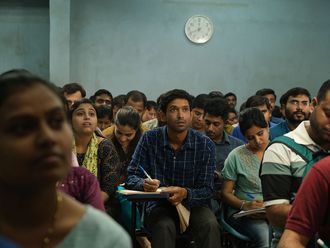_resources1_16a4a16549f_medium.jpg)
An Orchestra of Minorities
By Chigozie Obioma, Little, Brown, 464 pages, £14.99
When selecting his books of the year for the Observer in 2017, the Nigerian writer Chigozie Obioma picked George Saunders’s Booker-winning novel Lincoln in the Bardo, it might have been a more ticklish choice than he let on at the time. Obioma recently said he usually avoids anything that “remotely resembles” his own work, adding that he had only read Saunders’s book — narrated by a chorus of the undead — after assigning it to his creative writing students at the University of Nebraska-Lincoln, a decision he regretted after realising “halfway through” that it “marginally” resembled his new novel.
Obioma has nothing to worry about; rather, the success of Lincoln in the Bardo could well warm up readers for the challenge of An Orchestra of Minorities. Where his Booker-shortlisted debut, The Fishermen, a boyhood adventure in 1990s Nigeria, felt like the work of a born storyteller, his new book — a mystical star-crossed romance — is more polished, more painstakingly constructed and harder going, at least to start with.
Set in 00s Nigeria, it follows Nonso, a chicken farmer in love with Ndali, a trainee pharmacist he meets after her long-term boyfriend marries another woman. When Ndali’s wealthy parents take issue with Nonso’s lack of education, his somewhat rash response — as his family’s sole heir — is to sell up to fund university study in Cyprus, acting on a tip from an ex-classmate who acts as go-between, asking for the proceeds from Nonso’s sale so he can pay the institution upfront.
It’s no shock when Nonso arrives in Cyprus to find he’s fallen for a scam (“I pay, pay, pay to come here and then what did I discover? Africa in Europe,” a fellow victim complains). So begins an arduous quest for redress, as passers-by shout “slave”, demand to feel his hair and mistake him for Brazilian footballer Ronaldinho; when an expat nurse from Germany takes him under her wing, things briefly look up, until her jealous husband scuppers Nonso’s plan to go home, degree or no.
_resources1_16a4a1654ba_original-ratio.jpg)
All this is narrated by Nonso’s chi, or guardian spirit, who recounts his host’s life to fellow spirits in a kind of otherworldly tribunal based on Igbo myth. “Ijango-Ijango, over many sojourns in the human world, I have heard the venerable fathers, in their kaleidoscopic profundity, say that no matter the weight of grief, nothing can compel the eyes to shed tears of blood,” one chapter starts; the next begins: “Anungharingaobialili, when a man encounters something that reminds him of an unpleasant event in his past, he pauses at the door of the new experience, carefully considering whether or not to enter it.”
While these windy apostrophes seem to get in the way at first, there’s fun to be had from noticing how Obioma tackles the age-old implausibilities of omniscient narration simply by making it straightforwardly magical. There’s broader comedy, too, in the narrator’s dawning realisation that it has a job on its hands trying to protect a host who struggles to zip up his fly or remember where his phone is.
As in The Fishermen, Obioma’s figurative language is rich and vivid. A bad memory lingers “like insects around a glob of sugarcane, crawling into every crevice of [Nonso’s] mind”. It can be pleasingly literal-sounding — Nonso puts off a difficult conversation by “push[ing] it like a thing with wheels into the future” — as well as comically graphic; Nonso, on telling Ndali’s father what he does for a living, feels like “a man whose extremities were bound and was then thrust naked into the central arena of a village, with nothing to hide himself”.
Above all, once it emerges from the ethereal haze, there’s the story itself, in which things can and do always get worse for Nonso, a perennial fall guy who, at the crushing finale, suddenly turns perpetrator, as Obioma’s absorbing tragicomedy painfully probes the perils of victimhood.









